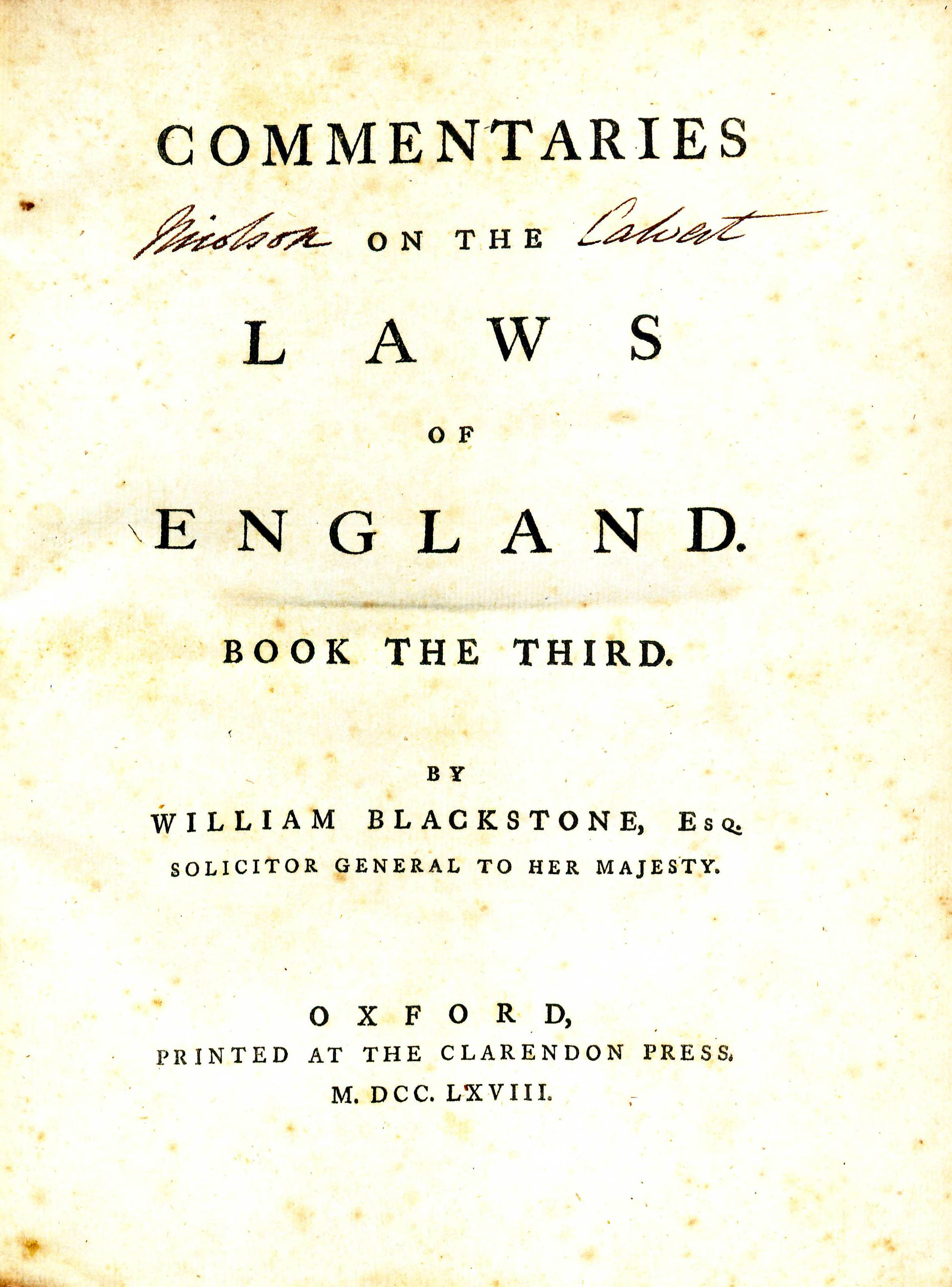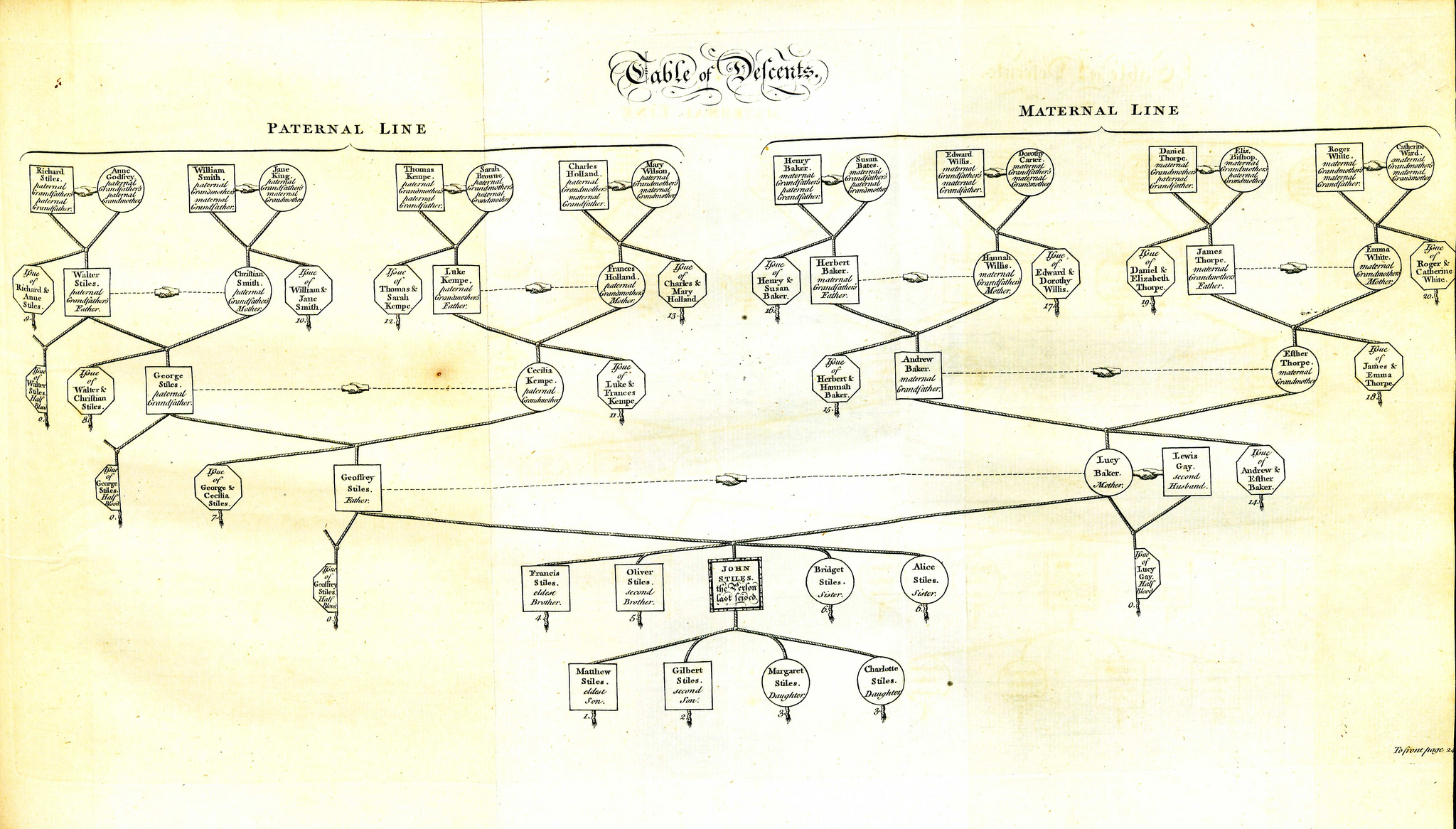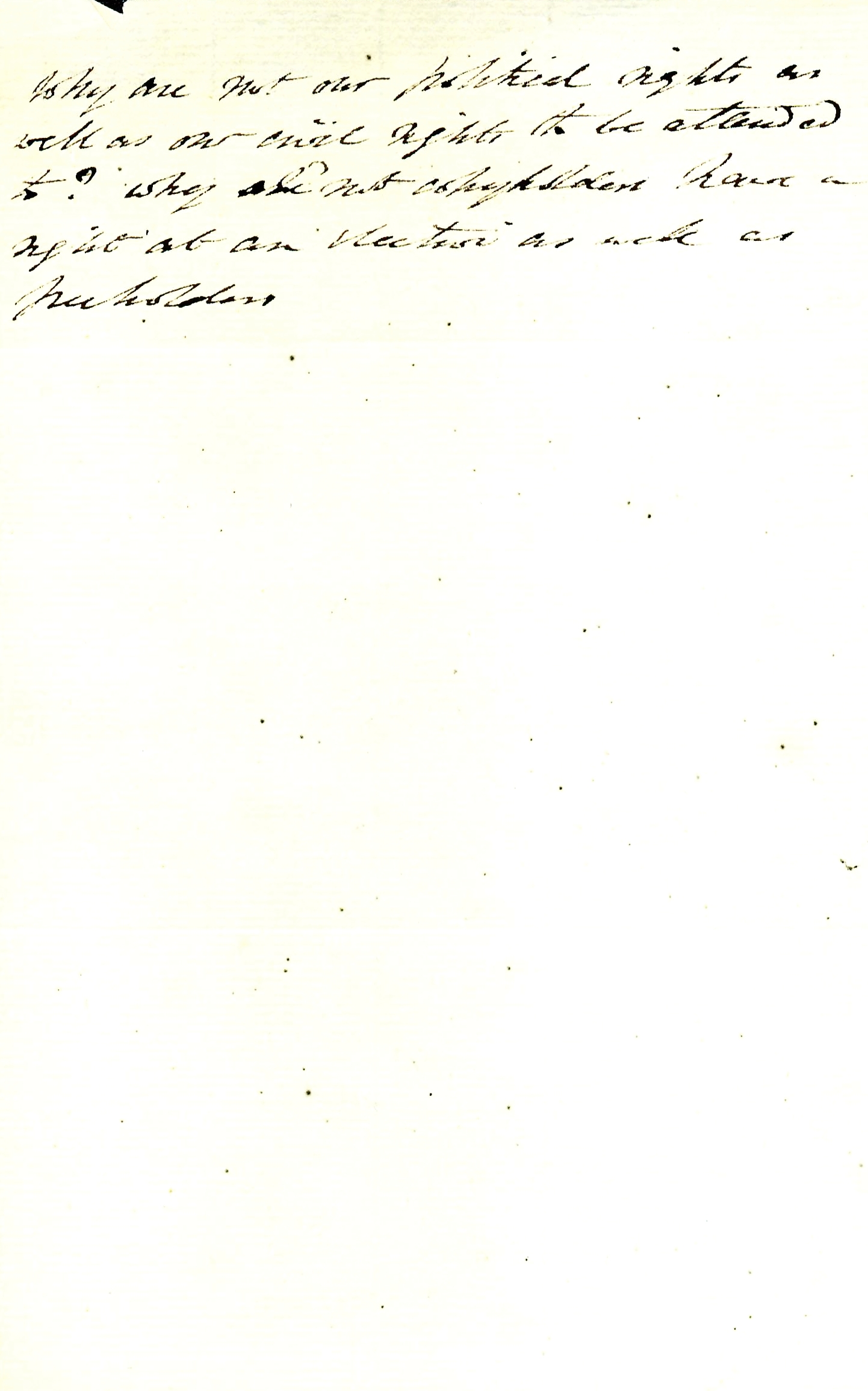Difference between revisions of "Commentaries on the Laws of England"
(New category.) |
m |
||
| (27 intermediate revisions by 9 users not shown) | |||
| Line 2: | Line 2: | ||
===by William Blackstone=== | ===by William Blackstone=== | ||
__NOTOC__ | __NOTOC__ | ||
| − | + | {{BookPageInfoBox | |
| − | + | |imagename=BlackstoneCommentariesv3TitlePage.jpg | |
| + | |link=https://wm.primo.exlibrisgroup.com/permalink/01COWM_INST/g9pr7p/alma991005164139703196 | ||
| + | |shorttitle=Commentaries on the Laws of England | ||
| + | |commontitle=Blackstone's Commentaries | ||
| + | |vol=volume three | ||
| + | |author=[[:Category:William Blackstone|William Blackstone]] | ||
| + | |publoc=[[:Category:Oxford|Oxford]] | ||
| + | |publisher=Printed at the Clarendon Press | ||
| + | |year=1765-1769 | ||
| + | |edition=First | ||
| + | |lang=[[:Category:English|English]] | ||
| + | |set=4 | ||
| + | |desc=[[:Category:Quartos|4to]] (27 cm.) | ||
| + | |shelf=F-4 | ||
| + | }}[[wikipedia:William Blackstone|William Blackstone's]] ''Commentaries on the Laws of England'' is considered "the most celebrated, widely circulated, and influential law book ever published in the English Language."<ref>Wilfrid Prest, "[http://www.oxforddnb.com/view/article/2536 Blackstone, Sir William (1723-1780)]" in ''Oxford Dictionary of National Biography'', accessed October 3, 2013.</ref> Blackstone was born in 1723, the son of a prosperous silk mercer in Cheapside, London.<ref>I. G. Doolittle, "Sir William Blackstone And His Commentaries on the Laws of England (1765–9): A Biographical Approach," ''Oxford Journal of Legal Studies'' 3, no. 1 (1983): 100.</ref> He was originally educated at the [[wikipedia:Charterhouse School|Charterhouse School]] and matriculated at [[wikipedia:Pembroke College, Oxford|Pembroke College of Oxford]] in 1738.<ref>Prest, "Blackstone, Sir William."</ref> Two years into his time at Oxford, Blackstone was admitted as a candidate to the [http://en.wikipedia.org/wiki/Bachelor_of_Civil_Law Bachelor in Civil Law] degree (BCL), and in 1741 was granted admission to the [[wikipedia:Middle Temple|Middle Temple]].<ref>Ibid.</ref> He was unsatisfied with practicing law, however, and preferred instead the academic life.<ref>Ibid.</ref> In his teaching, Blackstone sought to: | ||
| − | + | <blockquote> | |
| − | + | lay down a general and comprehensive Plan of the Laws of England; to deduce their History and Antiquities; to select and illustrate their Leading Rules, and Fundamental Principles; to explain their Reason and Utility; and to compare them frequently with the Laws of Nature and of other Nations; without dwelling too minutely on the Niceties of Practice, or the more refined Distinctions of particular Cases.<ref>Ibid.</ref> | |
| + | </blockquote> | ||
| − | ''' | + | [[File:BlackstoneCommentaries1765V2Table.jpg|left|thumb|350px|<center>Table of Descents, volume two.</center>]] |
| + | In 1758, Blackstone was awarded the title of the first [[wikipedia:Vinerian Professor of English Law|Vinerian chair of English law]], a salaried position created in accordance with the will of the late Charles Viner.<ref>Ibid.</ref> Seven years later, he published the first edition of his ''Commentaries on the Laws of England'', his premier work.<ref>Ibid.</ref> "In some 2000 pages the common law's tortuous complexities were outlined in a manner at once authoritative, clear, elegant, and even engaging."<ref>Ibid.</ref> The ''Commentaries'' were immediately a success. In their first printing in the colonies, 1400 copies were ordered for Philadelphia alone.<ref>William Bader, "Some Thoughts on Blackstone, Precedent and Originalism," ''Vermont Law Review'' 19, no. 5 (1995): 7.</ref> The ''Commentaries'' are ranked second only to the Bible in the amount of influence they played on the American founders.<ref>Ibid, 8.</ref> In the wake of his successful publication, Blackstone was appointed a [[wikipedia:Justice of the Common Pleas|Justice of the Common Pleas]] and served out his days on the bench until his death in 1780.<ref>Julian Waterman, "Mansfield and Blackstone's Commentaries," ''The University of Chicago Law Review'' 1, no. 4 (1934): 554.</ref> | ||
| − | ' | + | ==Evidence for Inclusion in Wythe's Library== |
| − | ''' | + | [[File:BlackstoneCommentariesLawsEnglandManuscriptNote.jpg|left|thumb|300px|Loose manuscript note from volume one.]] |
| + | Three of the Wythe Collection sources, Goodwin's Pamphlet<ref>Mary R. M. Goodwin, [https://research.colonialwilliamsburg.org/DigitalLibrary/view/index.cfm?doc=ResearchReports\RR0216.xml ''The George Wythe House: Its Furniture and Furnishings''] (Williamsburg, Virginia: Colonial Williamsburg Foundation Library, 1958), XLV-XLVI.</ref>, [[Dean Bibliography|Dean's Memo]]<ref>[[Dean Bibliography|Memorandum from Barbara C. Dean]], Colonial Williamsburg Found., to Mrs. Stiverson, Colonial Williamsburg Found. (June 16, 1975), 9 (on file at Wolf Law Library, College of William & Mary).</ref> and Brown's Bibliography,<ref>Bennie Brown, "The Library of George Wythe of Williamsburg and Richmond," (unpublished manuscript, May, 2012) Microsoft Word file. Earlier edition available at: https://digitalarchive.wm.edu/handle/10288/13433.</ref> list the first edition of Blackstone's ''Commentaries''. Goodwin cites Edwin Hemphill's dissertation, writing Hemphill "mentioned later law students' general use of Blackstone — so a copy was doubtless in Wythe's library."<ref>William Edwin Hemphill, "[[George Wythe the Colonial Briton|George Wythe the Colonial Briton: A Biographical Study of the Pre-Revolutionary Era in Virginia]]" (PhD diss., University of Virginia, 1937), 122.</ref> Dean cites William Clarkin's biography of Wythe which claims "Wythe used Blackstone as a text."<ref>William Clarkin, ''Serene Patriot: A Life of George Wythe'' (Albany, New York: Alan Publications, 1970), 154.</ref> Brown cites Wythe's arguments in Bolling v. Bolling.<ref>Bernard Schwartz, Barbara Wilcie Kern, and R. B. Bernstein, eds., ''Thomas Jefferson and Bolling v. Bolling: Law and the Legal Profession in Pres-Revolutionary America'' (San Marino, CA: The Huntingdon Library; New York: New York University School of Law, 1997), 147.</ref> Blackstone's ''Commentaries'' was also listed in Thomas Jefferson's [[Jefferson Inventory|inventory]] of [[Wythe's Library]] as "Blackstone's commentaries. 1st & 4th vols. 4to." This is one of the titles Jefferson kept but it is unclear what happened to Wythe's volumes. Brown suggests Jefferson's entry refers to the first American edition (Philadelphia, 1771-1772), arguing that Wythe owned both the first English and first American editions. [http://www.librarything.com/profile/GeorgeWythe George Wythe's Library]<ref>''LibraryThing'', s.v. "[http://www.librarything.com/profile/GeorgeWythe Member: George Wythe]," accessed on June 28, 2013.</ref> on LibraryThing includes Blackstone's ''Commentaries'' but doesn't list a specific edition. The Wolf Law Library followed the recommendation of Goodwin, Dean, and Brown and purchased the first English edition. | ||
| − | == | + | ==Description of the Wolf Law Library's copy== |
| − | + | Bound in modern full calf. Spines feature five raised bands with gilt lettering and decorative elements. Titles on red morocco labels, volume numbers on green morocco labels. Each volume includes the signature of "Nicholson Calvert" on the title page. Volume one has loose page of manuscript notes. | |
| − | + | Images of the library's copy of this book are [https://www.flickr.com/photos/wolflawlibrary/sets/72157637878018214 available on Flickr.] View the record for this book in [https://wm.primo.exlibrisgroup.com/permalink/01COWM_INST/g9pr7p/alma991005164139703196 William & Mary's online catalog.] | |
| − | == | + | ==See also== |
| − | [ | + | <div style="overflow: hidden;"> |
| + | *[[George Wythe Room]] | ||
| + | *[[Jefferson Inventory]] | ||
| + | *''[[Law Tracts]]'' | ||
| + | *[[Wythe's Library]] | ||
| + | </div> | ||
| − | + | ==References== | |
| + | <div style="overflow: hidden;"> | ||
<references/> | <references/> | ||
| + | </div> | ||
| + | |||
| + | ==External Links== | ||
| + | Read volume one of this title on [http://books.google.com/books?id=eK4WAAAAQAAJ&printsec=frontcover Google Books]. | ||
[[Category:English Law]] | [[Category:English Law]] | ||
[[Category:George Wythe Collection at William & Mary's Wolf Law Library]] | [[Category:George Wythe Collection at William & Mary's Wolf Law Library]] | ||
| + | [[Category:Jefferson's Books]] | ||
[[Category:Titles in Wythe's Library]] | [[Category:Titles in Wythe's Library]] | ||
| + | [[Category:William Blackstone]] | ||
| + | |||
| + | [[Category:English]] | ||
| + | [[Category:Oxford]] | ||
| + | [[Category:Quartos]] | ||
Latest revision as of 10:25, 23 May 2024
by William Blackstone
| Blackstone's Commentaries | |
|
Title page from Commentaries on the Laws of England, volume three, George Wythe Collection, Wolf Law Library, College of William & Mary. | |
| Author | William Blackstone |
| Published | Oxford: Printed at the Clarendon Press |
| Date | 1765-1769 |
| Edition | First |
| Language | English |
| Volumes | 4 volume set |
| Desc. | 4to (27 cm.) |
| Location | Shelf F-4 |
William Blackstone's Commentaries on the Laws of England is considered "the most celebrated, widely circulated, and influential law book ever published in the English Language."[1] Blackstone was born in 1723, the son of a prosperous silk mercer in Cheapside, London.[2] He was originally educated at the Charterhouse School and matriculated at Pembroke College of Oxford in 1738.[3] Two years into his time at Oxford, Blackstone was admitted as a candidate to the Bachelor in Civil Law degree (BCL), and in 1741 was granted admission to the Middle Temple.[4] He was unsatisfied with practicing law, however, and preferred instead the academic life.[5] In his teaching, Blackstone sought to:
lay down a general and comprehensive Plan of the Laws of England; to deduce their History and Antiquities; to select and illustrate their Leading Rules, and Fundamental Principles; to explain their Reason and Utility; and to compare them frequently with the Laws of Nature and of other Nations; without dwelling too minutely on the Niceties of Practice, or the more refined Distinctions of particular Cases.[6]
In 1758, Blackstone was awarded the title of the first Vinerian chair of English law, a salaried position created in accordance with the will of the late Charles Viner.[7] Seven years later, he published the first edition of his Commentaries on the Laws of England, his premier work.[8] "In some 2000 pages the common law's tortuous complexities were outlined in a manner at once authoritative, clear, elegant, and even engaging."[9] The Commentaries were immediately a success. In their first printing in the colonies, 1400 copies were ordered for Philadelphia alone.[10] The Commentaries are ranked second only to the Bible in the amount of influence they played on the American founders.[11] In the wake of his successful publication, Blackstone was appointed a Justice of the Common Pleas and served out his days on the bench until his death in 1780.[12]
Evidence for Inclusion in Wythe's Library
Three of the Wythe Collection sources, Goodwin's Pamphlet[13], Dean's Memo[14] and Brown's Bibliography,[15] list the first edition of Blackstone's Commentaries. Goodwin cites Edwin Hemphill's dissertation, writing Hemphill "mentioned later law students' general use of Blackstone — so a copy was doubtless in Wythe's library."[16] Dean cites William Clarkin's biography of Wythe which claims "Wythe used Blackstone as a text."[17] Brown cites Wythe's arguments in Bolling v. Bolling.[18] Blackstone's Commentaries was also listed in Thomas Jefferson's inventory of Wythe's Library as "Blackstone's commentaries. 1st & 4th vols. 4to." This is one of the titles Jefferson kept but it is unclear what happened to Wythe's volumes. Brown suggests Jefferson's entry refers to the first American edition (Philadelphia, 1771-1772), arguing that Wythe owned both the first English and first American editions. George Wythe's Library[19] on LibraryThing includes Blackstone's Commentaries but doesn't list a specific edition. The Wolf Law Library followed the recommendation of Goodwin, Dean, and Brown and purchased the first English edition.
Description of the Wolf Law Library's copy
Bound in modern full calf. Spines feature five raised bands with gilt lettering and decorative elements. Titles on red morocco labels, volume numbers on green morocco labels. Each volume includes the signature of "Nicholson Calvert" on the title page. Volume one has loose page of manuscript notes.
Images of the library's copy of this book are available on Flickr. View the record for this book in William & Mary's online catalog.
See also
References
External Links
Read volume one of this title on Google Books.


